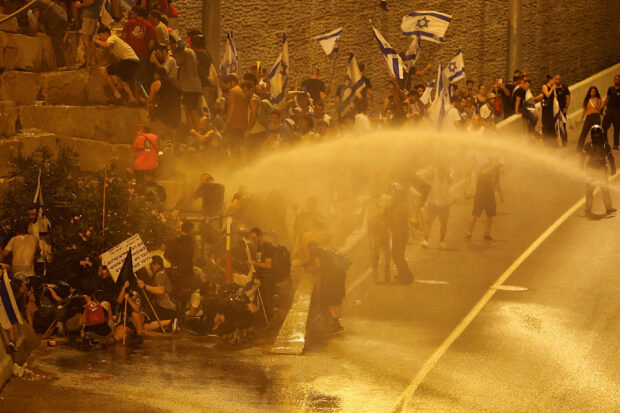Thousands rally, Israeli reservists step up protest against judicial change

Israeli security forces use a water cannon as people demonstrate on the ‘Day of National Resistance’ in protest against Israeli Prime Minister Benjamin Netanyahu and his nationalist coalition government’s judicial overhaul, in Tel Aviv, Israel July 18, 2023. REUTERS/Ammar Awad
TEL AVIV — Protests against Prime Minister Benjamin Netanyahu’s judicial overhaul intensified on Tuesday with demonstrations nationwide, and a retired Israeli air force general said 161 of the corps’ reserve officers had vowed to no longer report for duty.
The officers, with ranks ranging from major to brigadier-general, notified the military of their decision over the last three days and would publish a joint statement – with names redacted – on Wednesday, Asaf Agmon told Reuters.
The drive by Netanyahu’s nationalist-religious coalition to change the justice system and curb some Supreme Court power has sparked unprecedented protests, bruised the economy and stirred concern for Israel’s democratic health among Western allies.
Some reservists have threatened not to heed call-up orders as part of the protest.
That has jarred a country for which the conscript military, which draws on reserves in wartime and requires they undergo regular training, was long an apolitical issue to rally around.
Article continues after this advertisement“This is the most impactful military protest so far – a critical blow to air force readiness,” said Agmon, a protest organizer and former brigadier-general who at 75 is past reserve duty age.
Article continues after this advertisementAsked for confirmation, an Israeli military spokesperson declined to comment.
Reuters could not independently verify the identities of the 161 or, given that air force numbers are classified, assess the impact of such a walkout on military readiness.
Agmon described the 161 protesting reservist officers as headquarters staff who run air force operations. Some also fly as pilots or navigators, he said. Air force reservists regularly take part in combat operations.
As protesters took to the streets, Defence Minister Yoav Gallant appealed for unity among the ranks. “We cannot exist in this land without the Israel Defence Forces,” he said at a memorial ceremony speech.
Thousands rally across the country
From the early hours of Tuesday, thousands rallied across the country, many waving Israeli flags. Protesters blocked at least half a dozen highways, staged demonstrations at major train stations in afternoon rush-hour and entered the Tel Aviv Stock Exchange, tossing fake banknotes as symbols of corruption.
Police officers deployed on horseback and used water cannons to disperse some of the protesters who had blocked roads during the night. At least 45 people were arrested, police said.
With the prime minister wielding a comfortable Knesset majority, opponents are hoping a fresh wave of protest can help scupper the legislation before final voting next week.
The government is pushing to pass the law that would curb the Supreme Court’s ability to void government and minister decisions or appointments by stripping the judges of the power to deem such decisions “unreasonable.”
It aims to pass the law before a July 30 Knesset recess.
Netanyahu, who is on trial for corruption charges he denies, has defended the proposed changes, vowing to keep “Israel a Jewish and democratic nation state, free and liberal, that holds sacrosanct majority rule alongside civil rights.”
At a memorial speech in Jerusalem he said his government was proceeding in a responsible and measured manner, seeking as broad an agreement as it can, to restore balance between the judiciary, legislature and executive.
Proponents of the changes say the Supreme Court has become too interventionist and that the change will facilitate effective governance.
Opponents say the change will weaken the Supreme Court, which in a country that has no constitution and a one-chamber parliament that is dominated by the government – has a critical role in protecting civil rights and liberties.
Washington has urged Netanyahu to seek consensus on judicial reforms.